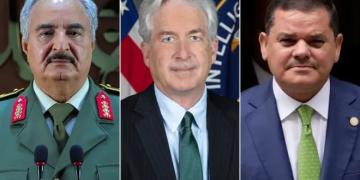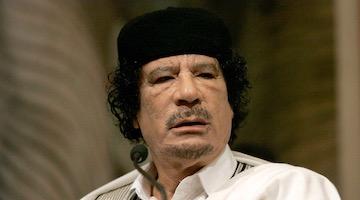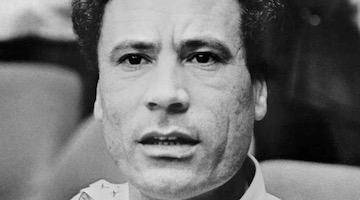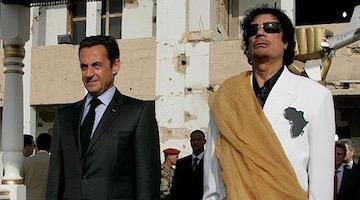The British, both left and right, simply do not want to acknowledge the role their government played in destroying Libya and the attendant migration crises.
“The destruction of Libya caused the first migration flow across the Mediterranean into Europe.”
Douglas Murray’s The Strange Death of Europe identifies three waves of migration to western Europe in the post-war period. Initially, migration to Britain and France came from their former colonies, to assist in the reconstruction in the 1950s and 1960s. Other western European countries also invited people from elsewhere to assist with reconstruction. Secondly, a wave of east European citizens arrived in the late 1990s and 2000s due to the expansive reach of the European Union. Murray’s book was written in the wake of the third and most recent migration wave in the past decade which was exacerbated by German Chancellor Angela Merkel’s announcement on the last day of August 2015 welcoming refugees from the war in Syria.
In contrast to Merkel’s decision to allow Syrian refugees into Germany, Murray notes that countries who were fueling the war in Syria were not as hospitable as European nations. As he writes:
“Throughout the Syrian portion of the refugee crises alone, next to nobody blamed the countries actually involved in that civil war – including Iran, Saudi Arabia, Qatar and Russia – for the human cost of the conflict. There was no wide European call for Iran to take in the refugees from the conflict, anymore than there was any pressure to insist Qatar take its fair share proportion of refugees.”[i]
Let’s take Murray at his word and put aside that there were reports of British support for the so-called Syrian rebels as early as 2012. If one reads between the lines of this excerpt and unpacks what he refers to as the “Syrian portion,” then we come face to face to the other portion of the migration crises. Namely, the one spurred by the NATO led campaign to remove Colonel Ghadhaffi from power in Libya. The so-called “Arab Spring” which began with the relatively peaceful overthrow the governments of Tunisia and Egypt in early 2011 was followed by an uprising in Benghazi, in eastern Libya which quickly turned into an insurgency. Western media concocted scenarios on how Ghadhaffi was on the verge of carrying out massacre after massacre if the West didn’t intervene.
“There were reports of British support for the so-called Syrian rebels as early as 2012.”
As such, Douglas Murray’s fellow Etonian, David Cameron who was then British Prime Minister, led the global campaign to military intervene in Libya in 2011 to supposedly prevent this horrible retribution. Cameron was supported by his calls to intervene in Libya by the entire British media. Especially in the right-wing media Mr. Murray currently furnishes readers with his latest opines. In 2011, the Daily Telegraph wanted to see military action in support of the “opposition” and against Colonel Ghadhaffi.
For example, in early March 2011, the British urge to drop bombs on Libya was dressed up as a western initiative to do so: a report claimed the “West is ready to Use Force against Ghadhaffi” because for Cameron,
“…Gaddafi’s departure was Britain’s ‘highest priority,’ adding: ‘If helping the opposition would somehow bring that about, it is certainly something we should be considering…. As such certain individuals close to the British military informed the readership that it was ready for a ‘Libyan mission.’”
British plans for intervention hit a stumbling block according to Christopher Hope of the Telegraph, when other world leaders shunned the idea.8 A spotlight was then placed on what the right-wing media perceived to be then President Obama’s foot dragging. As such Obama was clearly singled-out as an obstacle to the British urge for military intervention or rather a no-fly zone. On the 11th March 2011, another report in the Daily Telegraph openly queried the nature of Obama’s strategy:
“Is it cowardice? Is it indecisiveness? Or is it clever diplomacy?” before concluding that because of “America's size and military power, the American president does not have the option to remain neutral indefinitely…” As we all know, Great Britain has always known what’s best when it comes to what direction American foreign policy should take.
“Obama was clearly singled-out as an obstacle to the British urge for military intervention.”
A comment piece in the Sunday Telegraph on the 13th March, contrasted Cameron’s urge to intervene in Libya with Obama’s “paralysis.” The author goes go on to “hope” that Obama “follows Cameron's lead, as Clinton followed Blair's lead in Kosovo.” However, the writer does possess the honesty to argue that intervention is in Britain’s interests:
“The argument for intervention in Libya is not purely or even primarily humanitarian, however. Even if one sets aside its importance as an oil-producing nation, Libya remains central to Britain's strategic and commercial interests in the region.”
It is only natural the Telegraph editorialized over the next couple of days that Obama’s “silence” is “hurting the West” (the “West” here is a generic metaphor meaning British interests). One of the ways the silence is hurting the ‘West’ is because:
“…staying out of other people's quarrels in the most volatile and oil-rich region on the planet is not a realistic foreign policy.”
More so, the Daily Telegraph reported that Cameron is finding it “frustrating” working with Obama.[ii] This is now further confirmed in Cameron’s autobiography were he unapologetically writes that he wanted to establish a no fly zone to prevent a supposed potential massacre but found that Obama was an obstacle and needed convincing to militarily intervene in Libya.
In 2016, a British Parliamentary report into the Libyan intervention conceded that it “could not verify the actual threat to civilians posed by the Ghadhaffi regime; it selectively took elements of Muammar Ghadhaffi’s rhetoric at face value…” and that the British government, “failed to identify the militant Islamist extremist element in the rebellion.” As such the intervention was based on “erroneous assumptions.”
As a result, the destruction of Libya caused the first migration flow across the Mediterranean into Europe. Before 2011, according to open sources, Libya was a point of destination for millions of African migrant workers. The figures are not definite, but on my trips to Tunisia, I was reliably informed that at least 900,000 Tunisians were working in Libya. Other nationals working in Libya before the NATO intervention included up to 1.5 million Egyptians, roughly 1.5 million from sub-Saharan Africa and many more. More so, the NATO intervention then compelled millions of Libyans to flee their country and internally displaced hundreds of thousands of others. The French newspaper Le Monde reported that as of 2014, there were between 600,000 and 1 million Libyan refugees in Tunisia.
“Libya was a point of destination for millions of African migrant workers.”
This “portion” of the Arab Spring is understated in Murray’s book. The human fallout from Cameron’s Libya intervention amounted to millions of refugees. Millions of Africans either went back to their countries of origin or made the perilous journey across the Mediterranean into Europe.
Another dimension to the Libya intervention was, as the historian Mark Curtis argues, the de facto alliance between the bombing campaign led by Britain and France and Islamist fighters. Also, according to Curtis, post-Ghadhaffi Libya became a training a hub for jihadis who then went on to Syria. About 3000 Tunisian and Libyan fighters travelled to Syria to join an al-Qaeda type group called Katibat al-Battar al-Libi which was founded by Libyans.
Before 2015, Murray states that more people were landing on the Italian island of Lampedusa because in “part this was because of the number of people fleeing changes of government and civil unrest.”[iii] Which I assume is an underhanded way of saying that they were fleeing Cameron’s regime-change operation in Libya. He then observes that the “first year of the Arab Spring was an especially bad time for the island.”[iv] No shit, Sherlock! Three years later in 2014, “…the year before the migrant crises “began” – 170,000 people arrived [in Lampedusa, Malta or Sicily]. Officials talk of solving the problem by filling Libya’s recent government vacuum”[v]This vacuum arrived by air, landed on the Libyan coastline and had nothing to do with David Cameron.
Murray constantly regales his readers of acts of terrorism and rapes allegedly committed by migrants.[vi] Yet for some reason he seems to have no space or time to inform his readers of one of the most heinous and depraved acts of sexual terrorism of the last decade. Namely, the British government invited hundreds of Libyans, who seem to have done British bidding against Colonel Ghadhaffi in 2011, to Britain for training in 2014. Small groups of these Libyan traitors (or “cadets” as the Guardian referred to them) left their Bassingbourn barracks to assault the local population and three were found guilty of raping a man. Indeed, since they had arrived in the summer of 2014, the police were forced to conduct, “frequent patrols around the Bassingbourn base as residents of the nearby village fear more “escapes” and attacks.”” One can only wonder why Murray quite deliberately avoided mentioning this very nasty episode. Was it because the finger of blame would ultimately point at then British Prime Minister, David Cameron?
“Libya became a training a hub for jihadis who then went on to Syria.”
Overall, Curtis argues, the Cameron-led intervention in Libya has so far spurred terrorist attacks in 14 different countries including the most horrific in Europe which was in Paris in 2015. The ring leader, Abdelhamid Abaaoud, of the Paris Bataclan terrorist attacks which killed 129 people is said to have received his training with a group that has its origins in the turmoil caused by the Libyan intervention.
Returning to 2011, no sooner had Cameron led the charge to destroy Libya than he began beating the drum for military intervention in Syria. Once again, this story is not covered in Murray’s reading of the Syria war. For him, the main external actors in that war were Iran, Saudi Arabia, Qatar and Russia. Yet in March 2012, Cameron flew to the United States to attempt to convince the United States to further engage in the war on Syria. In a preparatory interview with the historian Niall Ferguson he bemoaned Washington’s lack of interest in intervening in Syria.
In the summer of 2012 after the eastern half of Aleppo had been overrun and fallen to the opposition (i.e., jihadis), a report in the Independent noted that UK intelligence was assisting the jihadis by indirectly providing them with Syrian army troop movement. It further stated, “MI6 and the CIA are understood to be tacitly condoning the supply of heavy machineguns from Gulf countries to the rebels…One diplomat [then] denied that the British were ‘facilitating’ the supply of heavy machineguns. But…said he could not rule out the possibility that private contractors financed by countries such as Qatar were involved in providing arms.”
The Strange of Death Europe mentions Merkel by name no fewer than 58 times, while mentioning Cameron’s name, only five. It’s quite clear Murray’s aim is to whitewash and absolve British culpability for the migration crises and the ensuing mayhem. For Murray, the migration crises of the last decade pivots and singles out Merkel for opprobrium especially after her speech on 31st August 2015 which allowed for refugees from Syria to enter Europe. As a neoconservative, it would be an anathema for him to even suggest that British foreign policy, or specifically the Cameron led military intervention in Libya, was even a factor in the migration crises. One is compelled to ask whether the main aim of the book is to nonchalantly, even pathologically, pin the blame of the migration crises on Merkel rather than his fellow Etonian, David Cameron?
“No sooner had Cameron led the charge to destroy Libya than he began beating the drum for military intervention in Syria.”
In the Afterword of the paperback edition of the book, Murray boasts that no one can find fault with the facts in the book or “has even tried to contest or deny them.”[vii] Maybe the reason for this is that many of the people who became his detractors, agreed or acquiesced to the Libyan intervention. If they were to argue that the Libyan intervention caused and spurred the migration crises, then this would mean their support or acquiesce was wrong. For example, the left-wing comrades who run UK ant-war group, Stop the War Coalition couldn’t bring themselves to vocally oppose the Libyan war. All during the seven-month NATO bombing campaign, they managed to organize a grand total of one demonstration in London, in mid-week attended by no more than 35 people. The entire British media supported the Libyan intervention and when the Islamist rebels finally captured Ghadhaffi after NATO had located and bombed him, they lynched and raped him - the Guardian celebrated and gloated the following day on its front page that this was the “Death of a Dictator.”
High profile British Muslim organisations were fully on board with the intervention. The Muslim Brotherhood linked, Muslim Association of Britain endorsed the NATO intervention and the Outreach Director of the human rights group, Cage, Moazzam Begg, a former Guantanamo Bay detainee, not only was supportive of the insurgency but confirmed Curtis’s findings that many of the Libyan jihadis who were NATO’s foot soldiers immediately went on to form groups for regime change in Syria. Begg claims that, “many of the people who…had started the revolution in Libya and taken part in it militarily, had some experience, actually went on to set up and support some of the first resistance movements in Syria.” Begg further elaborated that when he was in Libya in 2012, then Turkish Prime Minister Erdogan visited and delivered a speech which he recorded. Erdogan told the assembled Libyans, “’today Libya, ghaddan (ie tomorrow) Syria’…Clearly his supporting it, the regime change…[to]do in Syria, what they did in Libya.” Before travelling to Syria, Begg met with, UK intelligence agency, MI5.
“Many of the Libyan jihadis who were NATO’s foot soldiers immediately went on to form groups for regime change in Syria.”
Furthermore, an entire socio-cultural movement of academic intellectuals associated with the study of resistance to western imperialism in the Global South in western universities kept quiet. Professor Laleh Khalili has referred to Murray as an “unconstructed posh racist” but jibes like this are much easier to deliver than ask self-probing questions about your acquiescence to the military intervention in Libya. Murray’s current nemesis, Professor Priyamvada Gopal simply denounces and categorises as “Ghadhaffist” anyone who questions the so-called rebellion in Libya or the NATO intervention. It’s amazing how these and many other intellectuals were reticent and withdrawn as an African country was destroyed by NATO creating millions of refugees, both Libyan and non-Libyan, yet boast about how their latest publications celebrate resistance to Western imperialism or how they use quotes from Walter Rodney’s “How Europe Underdeveloped Africa”. For all his faults, Ghadhaffi’s Libya had increased life expectancy from 51 years to 74. Illiteracy was almost wiped out and homelessness was near non-existent. The average per capita income was one of the highest in Africa at $16,500.[viii] He had actually supported Nelson Mandela and the African National Congress in their struggle against Apartheid South Africa. But all this means nothing for these and other cultural warriors ensconced in western ivory towers continuously exchanging school yard jibes with people who they feel threaten their jobs.
Also, in the Afterword of the book Murray briefly covers of the murder of 22 people in Manchester by a terrorist who seems to have received his training in Libya. It is only natural that Murray doesn’t bring to his readers attention that the terrorist’s family quickly travelled from Manchester, where he had been awarded exile, and joined the rebellion in Libya against Colonel Ghadhaffi and may have received his training after Libya was turned into a no-man’s land with competing jihadi groups fighting their turf war.
In conclusion, the Cameron led intervention is very similar to the Iran coup 1953 which was also initiated and led by the British. Iranian Prime Minister Mossedegh had taken the oil industry out of British multinational hands and nationalised this resource. The British back then needed to convince the Americans that Mossedegh warrants removing. The repercussions of the 1953 coup led to the not only to the Iranian revolution but the rise of militant movements in Germany such as the Red Army Faction. If there was no Iranian revolution then, there may not have been an Iran-Iraq war and the rest is history.[ix] Like the Iran coup, the British, both left and right, simply do not want to acknowledge and even whitewash the role the British government played in the destruction of Libya and the attendant migration crises. So far, the Libyan intervention has led to a migration windfall in Europe, a Syrian regime change operation which led to more refugees and terrorist attacks in Europe. Who knows where the ricochet will land next.
More so, according to Murray, migrants flock to Europe because they want to enjoy a better standard of living, receive state support and because the continent is a lot more peaceful and tolerant than other places in the world.[x] Or, evidently, it could be that in the last decade migrants flocked to Europe because British led military interventions (in collusion with jihadis or states that support jihadis) destroyed their countries and they had no choice but to search for another place to live.
[i] Douglas Murray, “The Strange Death of Europe: Immigration, Identity, Islam” (London: Bloomsbury Continuum, 2018), pg. 159
[ii] For a more detailed account of the Telegraph and the Times call for military intervention, see, Nu’man Abd al-Wahid, “Britain’s Libya Adventure”, https://socialistunity.com/britains-libya-adventure-and-the-misdirection-by-stop-the-war/ (accessed 25th August 2020)
[iii] Murray, op. cit., pg65
[iv] ibid., pg.66
[v] ibid., pg73
[vi] ibid., pg.153-4, pg.185-186, pg.194-7
[vii] ibid., pg.335
[viii] Maximilian Forte, “Slouching Towards Sirte: NATO’s War on Libya and Africa” (Montreal: Baraka Books, 2012), pg.143-144
[ix] Nu’man Abd al-Wahid, “Debunking the Myth of America’s Poodle: Great Britain Wants War” (Winchester: Zero Books, 2020), pg.108-110
[x] Murray, op. cit., pg. 59
COMMENTS?
Please join the conversation on Black Agenda Report's Facebook page at http://facebook.com/blackagendareport
Or, you can comment by emailing us at comments@blackagendareport.com
















